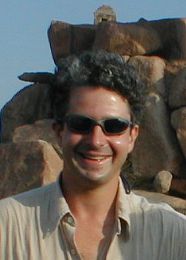|
|
 iMahal Interview Series:
iMahal Interview Series:
David Gimbel
July 22, 2001
iMahal:
It is early in your career. How many years do you think it will be before you start mentoring others?
 Gimbel:
I think on some level I've already started doing it. I was fortunate to be able to teach for a semester at the University of Vienna and to train some of its students at our excavation in Syria. I also get a tremendous amount of email from all sorts of people. I remember last year sitting in a restaurant in New York with my fiancée. I looked over at the next table and there was this college kid, reading a book that appeared to have Sumerian characters in it. I said, "I hate to be intrusive, but are you studying Sumerian?" And the guy said, "I'm trying to plod through this and I'm trying to figure out certain things about it..." He and I had a series of running email discussions. He was working on a project having something to do with Sumerian music and I was able to give him some information about the religion and about Sumerian liturgical hymns. I try to make myself available to anybody that I can. Of course you have to set boundaries, because you have to get your work done, and you'll also run into some loony people to whom you have to say, "look, I'm sorry but you're calling me every five minutes." But I think it's always important to make yourself available. A lot of people have made themselves available to me.
Gimbel:
I think on some level I've already started doing it. I was fortunate to be able to teach for a semester at the University of Vienna and to train some of its students at our excavation in Syria. I also get a tremendous amount of email from all sorts of people. I remember last year sitting in a restaurant in New York with my fiancée. I looked over at the next table and there was this college kid, reading a book that appeared to have Sumerian characters in it. I said, "I hate to be intrusive, but are you studying Sumerian?" And the guy said, "I'm trying to plod through this and I'm trying to figure out certain things about it..." He and I had a series of running email discussions. He was working on a project having something to do with Sumerian music and I was able to give him some information about the religion and about Sumerian liturgical hymns. I try to make myself available to anybody that I can. Of course you have to set boundaries, because you have to get your work done, and you'll also run into some loony people to whom you have to say, "look, I'm sorry but you're calling me every five minutes." But I think it's always important to make yourself available. A lot of people have made themselves available to me.

|
|
David Gimbel
|
I answer almost every single email that I get, every letter I get. It may take me a while. I may have a lot of other stuff I have to get through first, but I think it's important always to get back to people, always to try to make time for them. I think that it's important to never lose light of that. The day that you start saying that you're too busy to have human contact is the day that you've really lost something. I think I learned a lot about this actually from my fiancé, because Filipinos have this very deep family structure. Maybe that's a bad generalization, maybe it's not. But I think that the way they view life is very different. Americans tend to view their identity as their job, and then they come home to their family. Filipinos and maybe a lot of other cultures, Spanish people as well, view their jobs as something they have to do so that they can be with their family. That's a very different cultural conception, and it's one that I really like. You can feel totally passionate about what you do in your professional life, and that will add a lot to your life psychologically and on every other level. But you shouldn't forget that the primary feature in life is the human dimension. There will never be anything more important than the contact that you have with other people. I would feel very happy if at the end of my life I was able to look back and say, "okay, I had a positive influence on the lives of half a dozen people."

All photographs copyright and courtesy of David Gimbel or Archaeos

Note: This interview was conducted by Lokesh Datta and Joe Judge. After speaking with David Gimbel for more than two and a half hours on the telephone, Lokesh and Joe talked with excitement about how to present this interview. They realized that they had a lot of work to do, but they also realized that they had captured something very special. This is not just an interview. They decided it was actually a "Meta Interview." It is a story about stories: it tells the story of a life in progress, a life dedicated to unearthing stories from the past and bringing them to life. More than any iMahal interview to date, this telling by David Gimbel brings to life the things that people can experience on their own path to success: cultural influence, early struggles, generous mentors, difficult obstacles, a thirst for learning, and above all, self discovery. We hope you find it inspiring; Lokesh and Joe sure did.

|
 |




